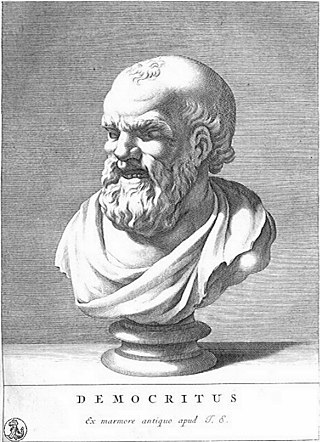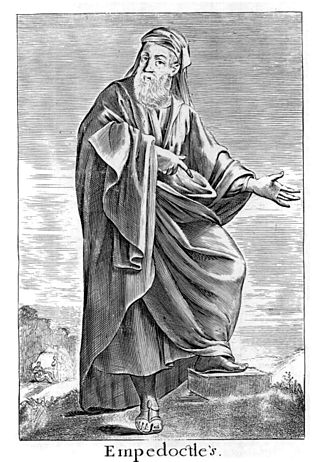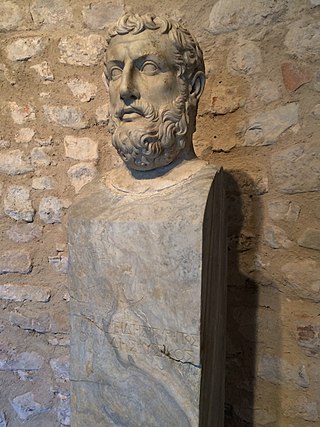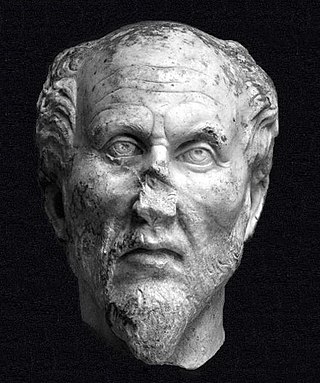Related Research Articles

Anaxagoras was a Pre-Socratic Greek philosopher. Born in Clazomenae at a time when Asia Minor was under the control of the Persian Empire, Anaxagoras came to Athens. According to Diogenes Laërtius and Plutarch, in later life he was charged with impiety and went into exile in Lampsacus; the charges may have been political, owing to his association with Pericles, if they were not fabricated by later ancient biographers.

Democritus was an Ancient Greek pre-Socratic philosopher from Abdera, primarily remembered today for his formulation of an atomic theory of the universe. None of his work has survived.

Empedocles was a Greek pre-Socratic philosopher and a native citizen of Akragas, a Greek city in Sicily. Empedocles' philosophy is best known for originating the cosmogonic theory of the four classical elements. He also proposed forces he called Love and Strife which would mix and separate the elements, respectively.

Heraclitus was an ancient Greek pre-Socratic philosopher from the city of Ephesus, which was then part of the Persian Empire.

Plato was an ancient Greek philosopher born in Athens during the Classical period.

Parmenides of Elea was a pre-Socratic Greek philosopher from Elea in Magna Graecia.
Pre-Socratic philosophy, also known as Early Greek Philosophy, is ancient Greek philosophy before Socrates. Pre-Socratic philosophers were mostly interested in cosmology, the beginning and the substance of the universe, but the inquiries of these early philosophers spanned the workings of the natural world as well as human society, ethics, and religion. They sought explanations based on natural law rather than the actions of gods. Their work and writing has been almost entirely lost. Knowledge of their views comes from testimonia, i.e. later authors' discussions of the work of pre-Socratics. Philosophy found fertile ground in the ancient Greek world because of the close ties with neighboring civilizations and the rise of autonomous civil entities, poleis.

Plotinus was a Hellenistic Platonist philosopher, born and raised in Roman Egypt. Plotinus is regarded by modern scholarship as the founder of Neoplatonism. His teacher was the self-taught philosopher Ammonius Saccas, who belonged to the Platonic tradition. Historians of the 19th century invented the term "neoplatonism" and applied it to refer to Plotinus and his philosophy, which was vastly influential during late antiquity, the Middle Ages, and the Renaissance. Much of the biographical information about Plotinus comes from Porphyry's preface to his edition of Plotinus' most notable literary work, The Enneads. In his metaphysical writings, Plotinus described three fundamental principles: the One, the Intellect, and the Soul. His works have inspired centuries of pagan, Jewish, Christian, Gnostic, and early Islamic metaphysicians and mystics, including developing precepts that influence mainstream theological concepts within religions, such as his work on duality of the One in two metaphysical states.

Zeno of Elea was a pre-Socratic Greek philosopher. He was a student of Parmenides and one of the Eleatics. Born in Elea, Zeno defended his instructor's belief in monism, the idea that only one single entity exists that makes up all of reality. He rejected the existence of space, time, and motion. To disprove these concepts, he developed a series of paradoxes to demonstrate why these are impossible. Though his original writings are lost, subsequent descriptions by Plato, Aristotle, Diogenes Laertius, and Simplicius of Cilicia have allowed study of his ideas.

Eduard Gottlob Zeller was a German philosopher and Protestant theologian of the Tübingen School of theology. He was well known for his writings on Ancient Greek philosophy, especially Pre-Socratic Philosophy, and most of all for his celebrated, multi-volume historical treatise The Philosophy of Greeks in their Historical Development (1844–52). Zeller was also a central figure in the revival of neo-Kantianism.
Diogenes of Apollonia was an ancient Greek philosopher, and was a native of the Milesian colony Apollonia in Thrace. He lived for some time in Athens. He believed air to be the one source of all being from which all other substances were derived, and, as a primal force, to be both divine and intelligent. He also wrote a description of the organization of blood vessels in the human body. His ideas were parodied by the dramatist Aristophanes, and may have influenced the Orphic philosophical commentary preserved in the Derveni papyrus. His philosophical work has not survived in a complete form, and his doctrines are known chiefly from lengthy quotations of his work by Simplicius, as well as a few summaries in the works of Aristotle, Theophrastus, and Aetius.

Xenophanes of Colophon was a Greek philosopher, theologian, poet, and critic of Homer from Ionia who travelled throughout the Greek-speaking world in early Classical Antiquity.
The Eleatics were a group of pre-Socratic philosophers and school of thought in the 5th century BC centered around the ancient Greek colony of Elea, located in present-day Campania in southern Italy, then known as Magna Graecia.

Parmenides is one of the dialogues of Plato. It is widely considered to be one of the most challenging and enigmatic of Plato's dialogues. The Parmenides purports to be an account of a meeting between the two great philosophers of the Eleatic school, Parmenides and Zeno of Elea, and a young Socrates. The occasion of the meeting was the reading by Zeno of his treatise defending Parmenidean monism against those partisans of plurality who asserted that Parmenides' supposition that there is a one gives rise to intolerable absurdities and contradictions. The dialogue is set during a supposed meeting between Parmenides and Zeno of Elea in Socrates' hometown of Athens. This dialogue is chronologically the earliest of all as Socrates is only nineteen years old here. It is also notable that he takes the position of the student here while Parmenides serves as the lecturer.
Gregory Vlastos was a preeminent scholar of ancient philosophy, and author of many works on Plato and Socrates. He transformed the analysis of classical philosophy by applying techniques of modern analytic philosophy to restate and evaluate the views of Socrates and Plato.
Peter Kingsley is a mystic, philosopher, and scholar. He is the author of six books and numerous articles, including Ancient Philosophy, Mystery and Magic; In the Dark Places of Wisdom; Reality; A Story Waiting to Pierce You: Mongolia, Tibet and the Destiny of the Western World; Catafalque: Carl Jung and the End of Humanity; and A Book of Life. He has written extensively on the pre-Socratic philosophers Parmenides and Empedocles and the world they lived in.

Hermann Alexander Diels was a German classical scholar, who was influential in the area of early Greek philosophy and is known for his standard work Die Fragmente der Vorsokratiker. Diels helped to import the term Presocratic into classical scholarship and developed the Diels–Kranz numbering system for ancient Greek Pre-Socratic texts.
Charles H. Kahn was a classicist and professor emeritus of philosophy at the University of Pennsylvania. His work focused on early Greek philosophy, up to the times of Plato. His 1960 monograph on Anaximander was still as of 2020 the most important reference work on the subject, and his 1979 edition of the Heraclitus fragments likewise remained the most widely cited English translation of Heraclitus, more or less representing the 'standard interpretation' for non-expert scholars.

The Italian School of Pre-Socratic philosophy refers to Ancient Greek philosophers in Italy or Magna Graecia in the 6th and 5th century BC. The doxographer Diogenes Laërtius divides pre Socratic philosophy into the Ionian and Italian School. According to classicist Jonathan Barnes, "Although the Italian 'school' was founded by émigrés from Ionia, it quickly took on a character of its own." According to classicist W. K. C. Guthrie, it contrasted with the "materialistic and purely rational Milesians."
Alexander Phoebus Dionysiou Mourelatos is an American philosopher. He is a recipient of a Guggenheim Fellowship.
References
- ↑ Sattler, Barbara M. (28 May 2014). "Parmenides and Presocratic Philosophy by John Palmer (review)". Classical World . 107 (3): 421–423. doi:10.1353/clw.2014.0020. hdl: 10023/5330 . ISSN 1558-9234. S2CID 170709914 . Retrieved 12 January 2018.
- ↑ "John Palmer". John Simon Guggenheim Memorial Foundation . Retrieved 12 January 2018.